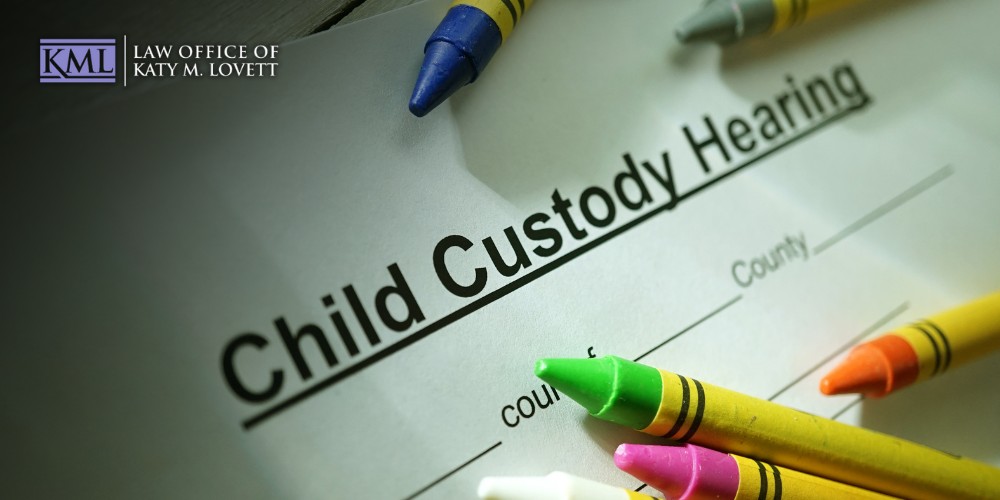Practice Areas
At the Law Office of Katy M. Lovett, we understand that child custody issues can be among the most challenging and emotionally charged aspects of family law. As a dedicated Williamson County child custody lawyer, Katy M. Lovett is committed to providing compassionate and knowledgeable legal support for your child custody case.
Our law firm prioritizes the well-being of your children and works diligently to achieve custody arrangements that best serve their interests. Whether you are dealing with original custody proceedings, modifications, or enforcement of existing court orders, our Williamson County family law attorney is here to guide you through every step.
Call our law firm at 512-956-5356 to schedule a consultation with experienced Williamson County child custody lawyer Katy M. Lovett.

Types of Custody in Williamson County
Understanding child custody is crucial for parents experiencing a separation or divorce in Williamson County. Knowing the different types of child custody, officially termed “conservatorship” in Texas, is essential for making informed decisions that prioritize the well-being of your children.
Each type of child custody agreement carries distinct responsibilities and privileges concerning the upbringing and care of minor children.

Joint Custody
Joint custody, also known as joint managing conservatorship in Texas, is a custody arrangement where both parents may share the responsibilities and decision-making authority concerning their child’s upbringing.
This arrangement generally strives to emphasize collaboration and cooperation between parents to ensure the child’s well-being. While joint custody does not always equate to equal physical custody time, it typically allows both parents to have significant involvement in their child’s life.
In Williamson County, the specifics of joint custody, including visitation schedules and decision-making rights, are outlined in a court-approved parenting plan tailored to each family’s unique needs.
Sole Custody
Sole custody, also referred to as sole managing conservatorship in Texas, grants one parent the majority of legal rights and responsibilities regarding their child’s upbringing. In this child custody arrangement, the designated sole managing conservator assumes primary decision-making authority concerning crucial aspects of the child, such as education, invasive medical decisions, and residence.
Sole custody is awarded when the court determines it is in the child’s best interest, often due to the other parent’s unfitness or inability to provide a stable environment. While the other parent may still have visitation rights, the sole custodian holds the primary decision-making rights for the day-to-day care and upbringing of the child.
How to Get Custody of a Child in Texas?
Child custody cases generally begin by filing a petition with the family court outlining the request for conservatorship, possession and access, and support. This petition includes details about the relationship between the parents and any relevant factors affecting the child’s well-being that the petitioner wants the court to consider. Both parents may be required to attend a formal mediation to attempt to agree on custody arrangements outside of court.
In the event that the parties cannot reach an agreement, the parties will ask the court to make a determination based on the child’s interests, considering factors such as the parent’s ability to provide a stable environment, the child’s relationship with each parent, and any history of abuse or neglect.
If you’re involved in a child custody battle, you need an experienced lawyer advocating not only on your behalf but also in the best interest of your children. Williamson County child custody lawyer Katy M. Lovett has an in-depth understanding of family law, including child custody. Contact the Law Office of Katy M. Lovett to schedule a consultation with an experienced family law attorney in Williamson County today.
How Williamson County Child Custody Lawyers Can Help with Other Family Law Matters

Child custody lawyers are pivotal not only in managing custody disputes but also in addressing a range of other family law matters. Their expertise is crucial in divorce proceedings, where they help negotiate agreements on property division, spousal support, and child support.
Additionally, child custody attorneys handle adoption processes and paternity disputes, providing crucial legal representation and guidance. Their in-depth knowledge of family law ensures that clients are well-supported, securing the best possible outcomes for the children and safeguarding the custody rights of the parents.
Child Support in Williamson County
Child support is generally presumed to be in children’s best interest to help both parents contribute to their children’s well-being and daily expenses. The amount is usually calculated according to the Texas Child Support Guidelines, regulated by the Office of the Attorney General, factors in the noncustodial parent’s income, and the number of children supported.
The court may also adjust this amount, considering the child’s health, educational costs, or other circumstances affecting their living standards. Additionally, child support orders may be reviewed and revised if there’s a notable change in either parent’s financial circumstances or the child’s needs.
Parents looking to establish, modify, or enforce child support orders should consult with an experienced Williamson County child support lawyer to assist with the legal process and protect their children’s interests.
How Does Child Support Work?
Child support is a financial mechanism designed to ensure that both parents contribute to the essential needs of their children after a separation or divorce. The process typically begins with establishing paternity and assessing each parent’s financial capabilities and responsibilities.
Child support payments are usually made monthly and are intended to cover expenses related to the child’s needs. Courts have the authority to enforce these payments and can modify the support order if circumstances significantly change.
Child Custody FAQ
How to Get Full Custody of a Child as a Mother?
To obtain full custody as a mother, you must file a petition in family court and demonstrate that it is in the child’s best interests. Key considerations include the child’s safety, the stability of the home environment, and any history of abuse or neglect by the other parent. Supporting evidence such as school and medical records can strengthen your case.
How to Get Full Custody of a Child Without Going to Court?
To obtain full custody of a child without court intervention, parents need to reach a mutual agreement through informal negotiation or mediation. A detailed parenting agreement covering custody, visitation, and support should be created in the form of a final court order and submitted to the court for approval to make it legally binding.
If I Have Sole Custody, Do I Have to Allow Visitation?
If you have sole custody, you typically must allow visitation unless the court specifies otherwise. Sole custody pertains primarily to decision-making rights, not excluding the other parent from visitation, often granted to maintain the child’s relationship with both parents. Any concerns or changes to visitation should be legally addressed through the court to ensure compliance with legal standards.
Call a Williamson County Child Custody Attorney at the Law Office of Katy M. Lovett Today

Williamson County child custody lawyer Katy M. Lovett is committed to protecting your rights and the best interests of your child. Whether you need assistance with custody arrangements, child support, or other family law matters, we are here to help you achieve the best possible outcome.
Call the Law Office of Katy M. Lovett at 512-956-5356 to schedule a consultation and take the first step toward securing your family’s future.

At the Law Office of Katy M. Lovett, PLLC, you are not just a case number. Our family law attorney takes the time to listen to your concerns, understand your goals, and develop a strategic approach that aligns with your needs under Texas law.



